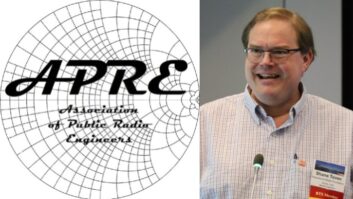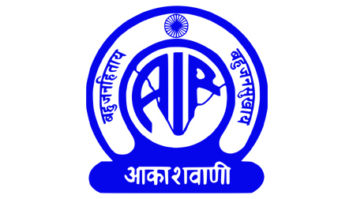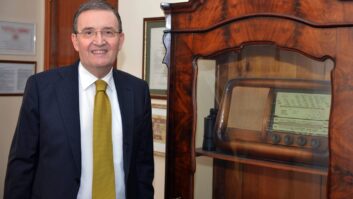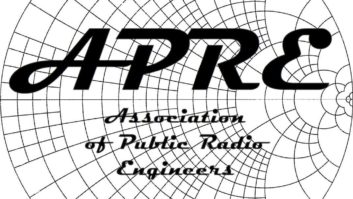
WILMINGTON, Del. — The federal judge presiding over DigiMedia’s patent infringement lawsuit against a number of radio groups is still considering when and if the case should resume now that the question of patentability of the technology appears to have been settled by the United States Patent and Trademark Office.
The broadcasters think two rounds of patent reexamination have left the plaintiff’s case diminished; a letter from their attorney to the judge states, “The reexaminations of the two patents greatly reduced the issues in the case and provide a path for streamlined, early resolution.”
But the patents have not been dismissed in full, and DigiMedia is pushing for the trial to move forward. Observers agree that the company is likely hoping for a quick resolution, since both patents expire in 2014.
The patents — numbers 5,809,246 and 5,629,867 — target digital media storage and automation systems that radio broadcasters commonly use. The suit was filed by Mission Abstract Data in 2011. Court records indicate that MAD is doing business as DigiMedia.
U.S. District Court Judge Leonard Stark stayed the federal lawsuit in late 2011 following an ex parte reexamination request by Broadcast Electronics, which is not a defendant in the lawsuit.
After one round of reexamination, the USPTO ordered a second in 2012, because “prior art” not previously available had been presented. DigiMedia then agreed to cancel some claims; and the USPTO issued two reexamination certificates this year. Other claims within the patents were narrowed. Nonetheless, the patents survived; and the judge could at any time resume the infringement litigation, observers said.
Attorneys representing DigiMedia have sent letters to the judge asking him the lift the stay.
The radio defendants — CBS Radio, Greater Media, Beasley Broadcasting, Cumulus, Entercom and Cox Radio — asked the judge to schedule talks between the sides to discuss the viability of the suit continuing, according to correspondence from the defendants’ attorney.
Unclear is whether broadcasters are more or less inclined to seek a settlement, given the outcome of the reexaminations. There is no indication the sides were meeting to discuss a settlement, according to court records; but the case remains in mediation before U.S. Magistrate Judge Christopher Burke, according to court documents. This leaves the door open for negotiations, observers said.
Judge Stark ordered mediation fairly early in the case; but it is non-binding unless the parties agree otherwise, according to legal observer Scott Daniels, an intellectual property attorney with Westerman, Hattori, Daniels & Adrian LLP.
He adds: “There is often a sense of ‘going through the motions.’”
PATENTS TO EXPIRE
As a result of the patent reexaminations, DigiMedia will be limited on any past or future recovery for patent 5,809,246, except for any new equipment purchased from July 2012 until the patent expires in January 2014, according to documents filed by the defendants’ attorney.
“It is somewhat surprising that Judge Stark has not restarted the case,” said Daniels. “On the other hand, the fact that these patents expire in the spring robs the case of its urgency.”
Daniels said it is unlikely a trial would conclude before the patents’ expiration, so that there is “no possibility of an injunction against future infringement,” leaving money damages as the only possible remedy for the plaintiff.
“When only money damages are possible, judges feel that a case can wait,” Daniels said.
A letter from DigiMedia attorney Sean O’Kelly to Judge Stark pushing for the stay in the federal case to be lifted lacked a sense of urgency, Daniels said. “The tone of the patentee lacks a certain oomph, suggesting that it might not believe that its prospects of a recovery at this point justify further litigation.”
Emails from Radio World to O’Kelly seeking comment on the case were not returned.
Bill Ragland, a patent attorney with Womble Carlyle Sandridge & Rice who is not involved with the case, said, “With patent expiration fast approaching, it remains to be seen whether [DigiMedia] will expend significant time and money to litigate the case all the way through a trial.”
Nonetheless, the defendants will be able to better defend themselves considering the USPTO’s move to cancel and narrow some of the claims in the patents.
“I think the outcome of the reexaminations greatly diminishes the value of [DigiMedia’s] legal claims against the broadcasters,” Ragland said. “If the case is not settled, I would expect the district court eventually to issue an order setting out the schedule for the case to proceed.”
John Phillips Jr., the attorney of record for the defendants, wrote the judge in July and described the patents as “very narrow” with avoidable features of hard drive music systems. In this case, “avoidable” likely means that the claim contains a limitation that people in the business can easily dispense with, thereby avoiding infringement of the patent, Daniels surmised.
Attempts by Radio World to reach Phillips for comment were unsuccessful.
Radio World asked Thomas Ewing, a patent attorney and IP consultant for Avancept LLC, his opinion of where the DigiMedia patent infringement case goes now.
“Patent law allows for damages to be collected six years back from the finding of infringement. However, if the patents expire next spring, then it should be really tough for the patent owners to argue for an injunction. Trials, especially patent trials, move at a snail’s pace. Among other things, the judge is hoping that the parties settle.
New Developments
There are new developments in a second round of patent infringement lawsuits filed earlier this year by DigiMedia Holdings Group against four additional broadcasters, all with FM stations in Texas. They are Access.1 Communications, Tomlinson-Leis Communications LP, Hunt County Radio LLC and NM Licensing LLC, according to court documents.
As in the first lawsuit described in the accompanying story, the plaintiff claims to hold patents involving hard-disk radio automation systems used by radio stations.
Court records indicate that in August, those cases were transferred from the U.S. Bankruptcy Court Eastern District of Texas to the District of Delaware in Wilmington and assigned to Judge Leonard Stark, the same judge presiding over the DigiMedia suit against CBS Radio, Greater Media, Beasley Broadcasting, Cumulus, Entercom and Cox Radio.
Court records indicate all parties connected to the Texas suits agreed to the change in venue for the “convenience of the parties and witnesses involved.”
John Phillips Jr., a patent attorney with Phillips, Goldman & Spence, P.A., is listed as lead defense attorney for the Texas broadcasters in addition to acting as counsel for all of the broadcasters in the original case.
“I suppose that the defendants could ask for another reexamination after the patents expire — though once a patent has expired, then the claims can’t be amended in any way during reexamination, which makes them extremely vulnerable to invalidation.”
ON THE HILL
Meanwhile, there has been some movement in Washington on regulations targeting so-called patent trolls, companies considered by critics to be abusers of patent litigation. An expansive article earlier this year in the New York Times specifically mentions the DigiMedia patents and the legal maneuverings of its predecessor Mission Abstract Data.
The Times article focused on a company called Intellectual Ventures, which was co-founded by Nathan Myhrvold, former chief technology officer at Microsoft. Intellectual Ventures buys and sells patents and licenses them. The company commonly threatens or files lawsuits, according to the article, through a network of hundreds of holding companies.
Mission Abstract Data is identified in the article as being affiliated with Intellectual Ventures. MAD filed the original patent infringement lawsuit against the broadcasters, but the patents were later assigned to DigiMedia.
Naomi Zeitlin, director of corporate communications for Intellectual Ventures, told Radio World previously that Mission Abstract Data had been owned by Intellectual Ventures but was sold prior to the tech patent infringement lawsuit being filed.
Several members of Congress have introduced legislation to combat patent trolls. FTC Chairwoman Edith Ramirez has urged an investigation and crackdown on patent abuses. In May, Sen. John Cornyn, R-Texas, introduced the Patent Abuse Reduction Act, a measure that aims to deter patent litigation abusers. More recently, Rep. Bob Goodlatte, R-Va., introduced the similar Innovation Act of 2013.
NAB Executive Vice President of Communications Dennis Wharton, while silent in regards to specifics surrounding the DigiMedia lawsuit, said: “For too long, U.S. economic growth has been stifled by ‘patent trolls’ who game the legal system with frivolous patent litigation. America’s hometown broadcasters look forward to working with Chairman Goodlatte and other House and Senate leaders to pass legislation that will deter patent abuses that are a drain on American businesses.”












